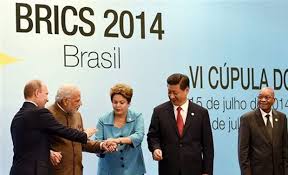Much anticipated, the second cycle of the BRICS Leaders meetings commenced in Fortaleza Brazil on July 15th. And as expected the first really concrete contribution to international development got off the ground – the BRICS Bank called the “New Development Bank”. This will change how many view the BRICS.
The Leaders, in fact, in their Declaration suggested that there were other initiatives to look forward to including an MOU on Cooperation among BRICS Export Credit and Guarantees Agencies and potentially BRICS insurance and reinsurance markets to pool capacities. Additionally, and also expected, the Leaders announced the creation of the BRICS Contingent Reserve Arrangement (CRA) – apparently a USD$100 billion facility for currency swaps by the BRICS in the instance of any liquidity or balance of payment issues.
The BRICS will receive great attention for this institutional creation, though we shall have to see what impact it will have on infrastructure development among the BRICS and to other developing countries. The resolution of the operational and governance side of the Bank looks unfortunately like a classic multilateral solution. The first chair of the Board of Governors shall be a Russian; the first chair of the Board of Directors shall be a Brazilian; the first President of the Bank will be an Indian; the bank headquarters will be in Shanghai; and the the Africa Regional Office will be in South Africa. Oh – and importantly – the initial subscribed capital will be USD$50 billion equally shared among all the BRICS.
The Fortaleza Declaration is unfortunately a classic multilateral document – far too lengthy – and a tour d’horizon of all conflicts the officials could possibly think of including conflicts in Africa, the Middle East, Ukraine, Iran, outer space , you name it – and including much too much diplomatic speak – what many of us refer to as the ‘blah blah blah’ of these communiques. Here is an unfortunate example :
To inaugurate the second cycle of BRICS Summits, the theme chosen for our discussions was “Inclusive Growth: Sustainable Solutions”, in keeping with the inclusive macroeconomic and social policies carried out by our governments and the imperative to address challenges to humankind posed by the need to simultaneously achieve growth, inclusiveness, protection and preservation.
And then there a couple of instances of almost breathtaking ‘chutzpah’ – the most obvious the condemnation of unilateral action – and yes I saw they bundled economic sanctions with aggression – remember Russia’s Putin was signing off on this:
We condemn unilateral military interventions and economic sanctions in violation of international law and universally recognized norms of international relations. Bearing in mind this in mind, we emphasize the unique importance of the indivisible nature of security, and that no State should strengthen its security at the expense of the security of others.
The BRICS should be more than slightly ashamed for their duplicity but at least they go no further than not condemning Russia’s actions in the Crimea. I must say the rationalization that US aggressive behavior equally has not been condemned, leaving open there determination not to condemn Russia – leaves me rather cold. Let’s at least try and deal with each situation on its merits. And Russia deserves condemnation. But at least no greater damage was done.
Almost as breathtaking is the strong endorsement of the role of the UN – what these Leaders describe as “the fundamental multilateral organization entrusted with helping the international community maintain international peace and security, protect and foster human rights and promote sustainable development” – which is fine and then pointing to the need for reform and to enhance the roles of Brazil, India and South Africa. Yet the Declaration fails to call for these powers to become members of a reformed Security Council – instead suggesting only that Russia and China “support their aspiration to play a greater role in the UN” – whatever that means. Not exactly a ring endorsement for their Security Council membership. But then how could it be.
Nevertheless, two things stand out. First the extensive Fortaleza Action plan. Now the enormous number of meetings of the ministers and expert groups of the BRICS is impressive. While many may pass without much notice or impact, and may not advance international policy collaboration, still there is a growing interaction and collaboration among all the BRICS officials. Some of these gatherings will I suspect advance positive collaborative work and certainly raise the level of collaboration among officials from these far flung states. This can only assist on collaborative policy making in a large number of issues including on urbanization, population, health, national statistical data, anti-drug and anti-corruption initiatives.
And the second is the New Development Bank. Obviously the Bank must still prove itself but it has the potential to seriously impact development and infrastructure in the BRICS but beyond in Africa and Asia more widely. The Bank along with other possible financial initiatives may well take a real ‘bite out’ of the traditional international institutions – World Bank and the MDBs – the multilateral development banks.
Finally, the declaration certainly leaves one with an uneasy feeling of the fading of US influence. This is not a statement about Power. There is no decline in that regard. But if we are speaking of ‘Order’ and the influence of the United States – well that is a different matter.
Image Credit: deccanchronicle.com



Pingback: BRICS: Greatest challenges lies ahead